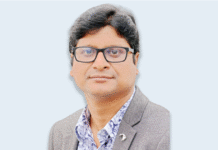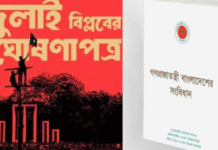Taj Hashmi
Prime Minister Sheikh Hasina’s recent advice to those institutions that produce medical doctors might have offended some. She asked them not to produce doctors who “kill patients” out of neglect and incompetence. I think her observation about the poor quality of teaching at medical college is also applicable to the deficiencies in other branches of pedagogy in the country.
We should not take the prime minister’s terse comment on the deficiency of doctors just as a casual observation, or joke. As well-to-do Bangladeshis avoid consulting local doctors, and prefer foreign schools and universities to the local ones for their children’s education, seemingly all is not well in the education system in the country.
This article is the sequel to my last piece in this column, which questioned if Dhaka University was ever the “Oxford of the East” (DS, December 28, 2014). Among other factors, the bulk of the brilliant students’ (mainly from Arts and Social Science) preference for civil service to university teaching during the Pakistan period contributed to the degeneration of higher education.
It’s time to look into some other factors in this regard: (a) Recently, only two out of 50,000 students qualified in the English proficiency test at an admission exam at Dhaka University. Surprisingly, English is a compulsory subject up to the HSC level throughout Bangladesh; (b) According to media reports, thousands of Indian workers — who work in Bangladesh illegally as executives in the private sector — remitted $3.7 billion to India in 2013 alone; (c) School teachers hardly teach anything in the classroom; they want students to come to them for private tuition, which is well beyond the level of affordability for the ordinary people, and even for high government officials who depend solely on their salaries; (d) Many students don’t spend time in the classroom or libraries. They are either full-time political workers or “armed cadres” — a euphemism for criminals — of the ruling or opposition parties, or engaged in various anti-social activities, including drug peddling and extortion. Politicians and criminals use unemployable students in their pursuit for power and influence in their constituencies.
The death and destruction during the Liberation War, and the post-independence mismanagement and inexperience of the rulers adversely affected the education system. In their desperation to save millions of starving people, and to get rid of the stigma of being Henry Kissinger’s “basket case” in the 1970s, successive governments unwittingly neglected the education sector by prioritising growing of more food and controlling of population growth up to the 1990s.
Although Bangladesh emerged as a secular and socialist democracy, neither has democracy ever flourished there nor have the vestiges of colonialism and special interest groups ever disappeared. Healthcare and education remain the most expensive “commodities” for the people. Consequently, as the main premise of this article suggests, education has not only become unaffordable for the masses, but its quality has also gone down the drain.
Surprisingly, during the last decade of British rule (1937-1947), ordinary Bengalis had more political freedom, social justice and better education opportunities than what is available in Bangladesh today. Even during the Pakistani period, while Bengalis had inferior rights and lesser opportunities than West Pakistanis, the quality of education was much better and more affordable for the lower classes than today. All public and private schools in East Bengal during the British and Pakistani periods maintained a semblance of conformity in the standard of education. Students from the lowest rung of society and from the remotest village schools could successfully compete against students from well-off families in the urban areas. Not anymore. Now, only children of well-to-do people, who can afford multiple private tutors to coach their children, can excel in public examinations and get into good universities at home and abroad.
What Bangladesh needs today to improve the quality of education at every level is not tons of money but tons of sincere and serious efforts by both the public and the private sectors. First, the government and the school management committees must ensure the accountability of teachers, and the quality of teaching in the classroom.
Second, the country needs more allocations in the education sector to raise teachers’ salary, build and update the infrastructure — classrooms, libraries, laboratories — buy books and journals, improve research facilities, and incentivise original research in every discipline. The government can reverse the degeneration of education (a) by admitting that the standard of education has deteriorated a lot (without highlighting what it has achieved in the meantime, let alone playing any blame game); (b) making the second highest allocation for education after health; and (c) adopting one universal system and medium of instruction and not continuing with the three different systems that exist today — English, Bengali, and Madrassah.
Where have all those philanthropes of the pre-1947 period disappeared? Cannot Muslim Bengalis be as generous as their Hindu counterparts? Why don’t the rich and powerful Bangladeshis (and anonymous donors) come forward to improve the quality of education? We know that while sections of the rich invest money to run private English medium schools and universities as business enterprises, there is hardly anyone coming forward to donate generously to build the infrastructure of a secular education system. There are people who would rather spend money to build madrassahs or Islamic seminaries, not for their own children, but for the marginalised poor.
Bangladesh has lessons to learn from the experience of failing states as well as from those who reversed the process of decline and degeneration primarily by revolutionising the education system. We have the bad examples of Algeria and Pakistan, which have nurtured three different mediums/systems of instruction — French, Arabic, and Islamic in Algeria; and English, Urdu and Madrassah in Pakistan, and created employable French and English elites, respectively in Algeria and Pakistan. The rift between the employable French/English elites and the backward vernacular elites led to long drawn civil wars and Islamist militancy for decades in Algeria, and Pakistan has not yet come out of the crisis of Islamist militancy and terrorism. The existence of three different mediums of instruction in Bangladesh should ring the bell.
In sum, Bangladesh has lessons to learn from Malaysia and Sri Lanka, not from Algeria and Pakistan. Cheap patriotism finally gave in to pragmatism in Malaysia and Sri Lanka. They no longer regard English as a vestige of colonialism. Mahathir Mohamed considers English language as indispensable as modern technology. Bangladesh can reverse the process of degeneration of its education system by re-emphasising English at every level of education; by substantially raising allocations for modern and liberal education; by making humanities and social science — literature, history, philosophy, sociology, economics and political science, for example — compulsory subjects for all students, including those who go to madrassahs, and to medical, engineering and technical colleges (as this is normative everywhere in the developed world). Without visionary ideas and critical thinking by its leaders, Bangladesh can’t reverse the process of degeneration in its education system. And nothing but world-class education is the key to peace, progress and prosperity.
The writer teaches security studies at Austin Peay State University in Tennessee. Sage has recently published his latest book, Global Jihad and America: The Hundred-Year War Beyond Iraq and Afghanistan.
Source: The Daily STar









